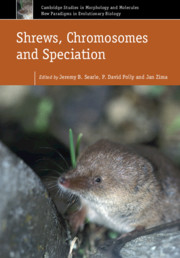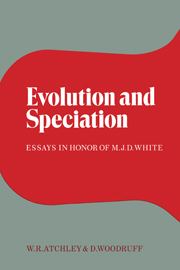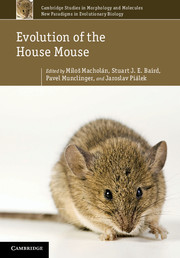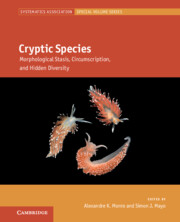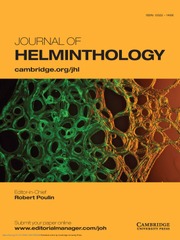Shrews, Chromosomes and Speciation
$96.99 ( ) USD
Part of Cambridge Studies in Morphology and Molecules: New Paradigms in Evolutionary Bio
- Editors:
- Jeremy B. Searle, Cornell University, New York
- P. David Polly, Indiana University
- Jan Zima, Academy of Sciences of the Czech Republic, Prague
- Date Published: February 2019
- availability: This ISBN is for an eBook version which is distributed on our behalf by a third party.
- format: Adobe eBook Reader
- isbn: 9781108750653
Find out more about Cambridge eBooks
$
96.99 USD
( )
Adobe eBook Reader
Other available formats:
Hardback
Looking for an examination copy?
If you are interested in the title for your course we can consider offering an examination copy. To register your interest please contact [email protected] providing details of the course you are teaching.
-
The chromosome complement (karyotype) often differs between related mammalian species (including humans vs chimpanzees), such that evolutionary biologists muse whether chromosomal difference is a cause or a consequence of speciation. The common shrew is an excellent model to investigate this problem because of its many geographical races (potential species) differing chromosomally, and its several sibling species (recently speciated forms) that are also chromosomally different. This system is an exceptional opportunity to investigate the role of chromosomes in speciation and this volume reflects detailed research following these approaches. Highlights include the demonstration that chromosomal re-arrangements can be associated with complete loss of gene flow and thus speciation and that selection within species hybrid zones may lead to de-speciation rather than speciation. This book represents an extraordinarily detailed consideration of the role of chromosomes in speciation in one astonishing species, providing insights to those interested in mammalian diversity, chromosomal evolution and speciation.
Read more- Provides an exceptional knowledge and understanding of an aspect of genetic variation of a single species based on studies of wild populations
- Features evaluation of the processes by which new species arise with focus on the roles of chromosomal rearrangements, hybridisation, hybrid zones and gene flow
- Presents multidisciplinary analysis of chromosomes, genetics, phenotypes, phylogeography and the fossil record
Reviews & endorsements
‘I found Shrews, Chromosomes and Speciation fascinating, and an enjoyable read. This volume will be a welcome addition to the library of any evolutionary biologist or graduate student interested in how the interactions of chromosomes and the genome shape diversity.’ Sally Potter, The Quarterly Review of Biology
Customer reviews
Not yet reviewed
Be the first to review
Review was not posted due to profanity
×Product details
- Date Published: February 2019
- format: Adobe eBook Reader
- isbn: 9781108750653
- contains: 113 b/w illus. 23 tables
- availability: This ISBN is for an eBook version which is distributed on our behalf by a third party.
Table of Contents
1. Milestones in common shrew chromosomal research Jan Zima and Jeremy B. Searle
2. Introducing the common shrew Nikolay A. Shchipanov, Jan Zima and Sara Churchfield
3. Morphology and genetics of the common shrew: general features Alina Mishta and Jeremy B. Searle
4. Phylogeography Susan Thaw, Thomas A. White, Anna A. Bannikova and Jeremy B. Searle
5. Chromosomal differentiation in the common shrew and related species Nina S. Bulatova, Larisa S. Biltueva, Svetlana V. Pavlova, Natalia S. Zhdanova and Jan Zima
6. Phylogenetic relationships of chromosomal races Thomas A. White, Jan M. Wojcik and Jeremy B. Searle
7. Meiosis and fertility associated with chromosomal heterozygosity Pavel M. Borodin, Stanisław Fedyk, Włodzimierz Chętnicki, Anna A. Torgasheva, Svetlana V. Pavlova and Jeremy B. Searle
8. Chromosomal hybrid zones Stanisław Fedyk, Svetlana V. Pavlova, Włodzimierz Chętnicki and Jeremy B. Searle
9. Gene flow between chromosomal races and species Glenn Yannic, Patrick Basset, Agnès Horn and Jacques Hausser
10. Geometric morphometric tests for phenotypic divergence between chromosomal races P. David Polly and Jan M. Wojcik
11. Is it really the chromosomes? Patrick Basset, Glenn Yannic and Jacques Hausser
12. Further divergence: the role of ecology and behaviour Boris I. Sheftel, Natalia V. Moraleva and Jacques Hausser
13. Climate, diversification and refugia in the common shrew: evidence from the fossil record P. David Polly
14. Shrews, chromosomes and speciation Jeremy B. Searle, Jan Zima and P. David Polly.
Sorry, this resource is locked
Please register or sign in to request access. If you are having problems accessing these resources please email [email protected]
Register Sign in» Proceed
You are now leaving the Cambridge University Press website. Your eBook purchase and download will be completed by our partner www.ebooks.com. Please see the permission section of the www.ebooks.com catalogue page for details of the print & copy limits on our eBooks.
Continue ×Are you sure you want to delete your account?
This cannot be undone.
Thank you for your feedback which will help us improve our service.
If you requested a response, we will make sure to get back to you shortly.
×
